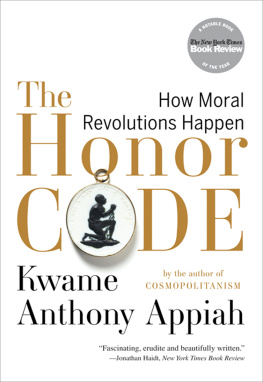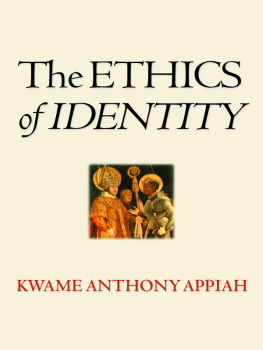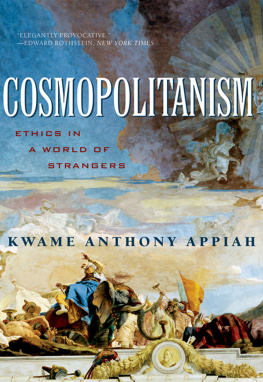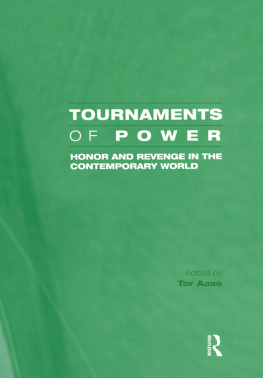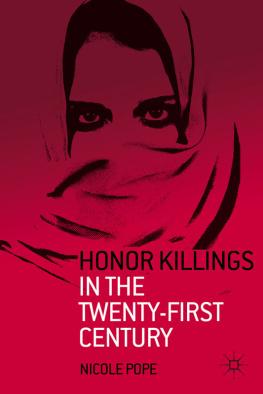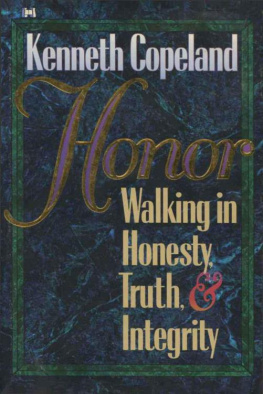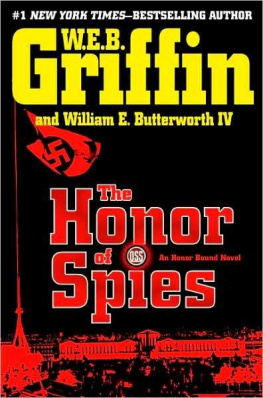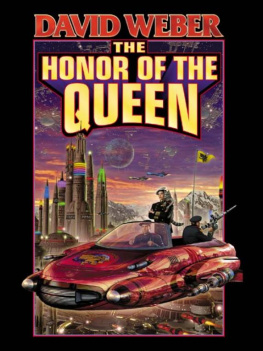W. W. NORTON & COMPANY
For information about permission to reproduce selections from this book, write to Permissions, W. W. Norton & Company, Inc., 500 Fifth Avenue, New York, NY 10110
Appiah, Anthony.
The honor code: how moral revolutions happen /
Kwame Anthony Appiah.1st ed.
p. cm.
Includes bibliographical references.
ISBN: 978-0-393-08071-1
1. Social changeHistory. 2. Social changeMoral and ethical aspects.
3. HonorSocial aspectsHistory. 4. Social ethics. I. Title.
HM836.A67 2010
303.48'409dc22
W. W. Norton & Company, Inc.
500 Fifth Avenue, New York, N.Y. 10110
www.wwnorton.com
W. W. Norton & Company Ltd.
Castle House, 75/76 Wells Street, London W1T 3QT
It would be a sort of irreligion, and scarcely less than a libel on human nature, to believe that there is any established and reputable profession or employment, in which a man may not continue to act with honesty and honor; and doubtless there is likewise none which may not at times present temptations to the contrary.
PREFACE
This book began with a simple question: What can we learn about morality by exploring moral revolutions? I was led to ask it because historians and philosophers have discovered a great deal about science through the careful study of scientific revolutions. Thomas Kuhn and Paul Feyerabend, for example, drew fascinating conclusions from explorations of the seventeenth-century Scientific Revolutionwhich gave us Galileo, Copernicus, and Newtonand of the more recent revolution that brought us the astonishing theories of quantum physics.
The growth of scientific knowledge has obviously spurred a massive explosion in technology. But the driving spirit of science is not to change the world but to understand it. Morality, on the other hand, as Immanuel Kant insisted, is ultimately practical: though it matters morally what we think and feel, morality is, at its heart, about what we do. So, since a revolution is a large change in a short time, a moral revolution has to involve a rapid transformation in moral behavior , not just in moral sentiments. Nevertheless, at the end of the moral revolution, as at the end of a scientific revolution, things look new. Looking back, even over a single generation, people ask, What were we thinking? How did we do that for all those years?
And so I began to examine a number of moral revolutions, looking to see what could be learned from them. I noticed almost immediately that the disparate cases I looked atthe collapse of the duel, the abandonment of footbinding, the end of Atlantic slaveryhad some unexpected features in common. One was that arguments against each of these practices were well known and clearly made a good deal before they came to an end. Not only were the arguments already there, they were made in terms that wein other cultures or other timescan recognize and understand. Whatever happened when these immoral practices ceased, it wasnt, so it seemed to me, that people were bowled over by new moral arguments. Dueling was always murderous and irrational; footbinding was always painfully crippling; slavery was always an assault on the humanity of the slave.
This was a surprise about what had not happened. The secondand, for me, much more surprisingobservation was about what had : in each of these transitions, something that was naturally called honor played a central role. This led to the inquiry whose results are gathered in this book. It is, of course, hardly astounding that dueling had to do with honor; nor even that the end of dueling came with new ideas about honor. But it is striking, to my mind, that ideas about national honor and the honor of workingmen far removed from the plantations of the New World figured so largely in the ending of footbinding and of modern slavery, respectively.
It turned out that these issues also connected pretty immediately with questions about the role of our social identitiesas men and women, gay and straight, Americans and Ghanaians, Christians, Muslims, and Jewsin shaping our sentiments and our choices. In an earlier book, I had explored some of the ways in which identifications with families, ethnic groups, religions, and nations could bind us to others in pride and shame. So I was perhaps especially prepared to see the connections between honor and identity that are at the heart of the moral revolutions Ill be discussing.
This seems to me a connection well worth noticing. Identity connects these moral revolutions with an aspect of our human psychology that was widely neglected by moral philosophers working in English for too long, though it has come into sharper focus in recent moral and political philosophy: and that is our deep and persistent concern with status and respect, our human need for what Georg Wilhelm Friedrich Hegel called Anerkennung recognition. We human beings need others to respond appropriately to who we are and to what we do. We need others to recognize us as conscious beings and to acknowledge that we recognize them. When you glance at another person on the street and your eyes meet in mutual acknowledgment, both of you are expressing a fundamental human need, and both of you are respondinginstantaneously and without effortto that need you identify in each other. Hegels most famous discussion of the struggle for recognition comes in the exploration of the relationship of master and slave in the Phenomenology of Spirit . He would not, I think, have been surprised that something of the energy of the movements to abolish slavery came from a search for recognition.
So my inquiry led me somewhere a little unexpected: I want now to claim a crucial place for honor in our thinking about what it is to live a successful human life. Aristotle thought that the best life was one in which you achieved something he called eudaimonia , and he called the study of eudaimonia ethics. I think of this book as a contribution to ethics in Aristotles sense, which is the sense in which I aim to use the word myself.
Eudaimonia has been misleadingly translated as happiness, but what Aristotle meant is better captured by saying that to have eudaimonia is to flourish; and I would gloss flourishing as living well, so long as you dont think that the only thing to living well is being good to others. The values that guide us in deciding what we owe to others are a subset of the many values that guide our lives, and I think it is reasonable to call that special kind of value moral value. Dueling, footbinding, and slavery are obviously, in this sense, moral issues. (Slaves and footbound women and dead duelists are denied their due.)
Clearly, morality, in this sense, is an important dimension of ethics: doing what I should for others is part of living well, and one of the distinctive features of the last few centuries has been a growing appreciation of the obligations each of us has to other people. But there is much more to a good life than being morally good; and it is a besetting temptation of philosophy to scant the great multiplicity of the things that make human lives go well. A good life usually includes relationships with family and friends, which are governed not just by what we owe to others but also by what we freely give them out of love. Most of us also have our lives made better by social activity. We participate in a church or a temple; we play or watch sports together; we get involved in local and national politics. And we profit, too, from exposure to some of the many things that are valuable in human experience, including music, literature, film, and the visual arts, as well as from participation in the sorts of projects that we choose for ourselves, such as learning to cook well, or making a garden, or studying the history of our families. There are many kinds of human good.

